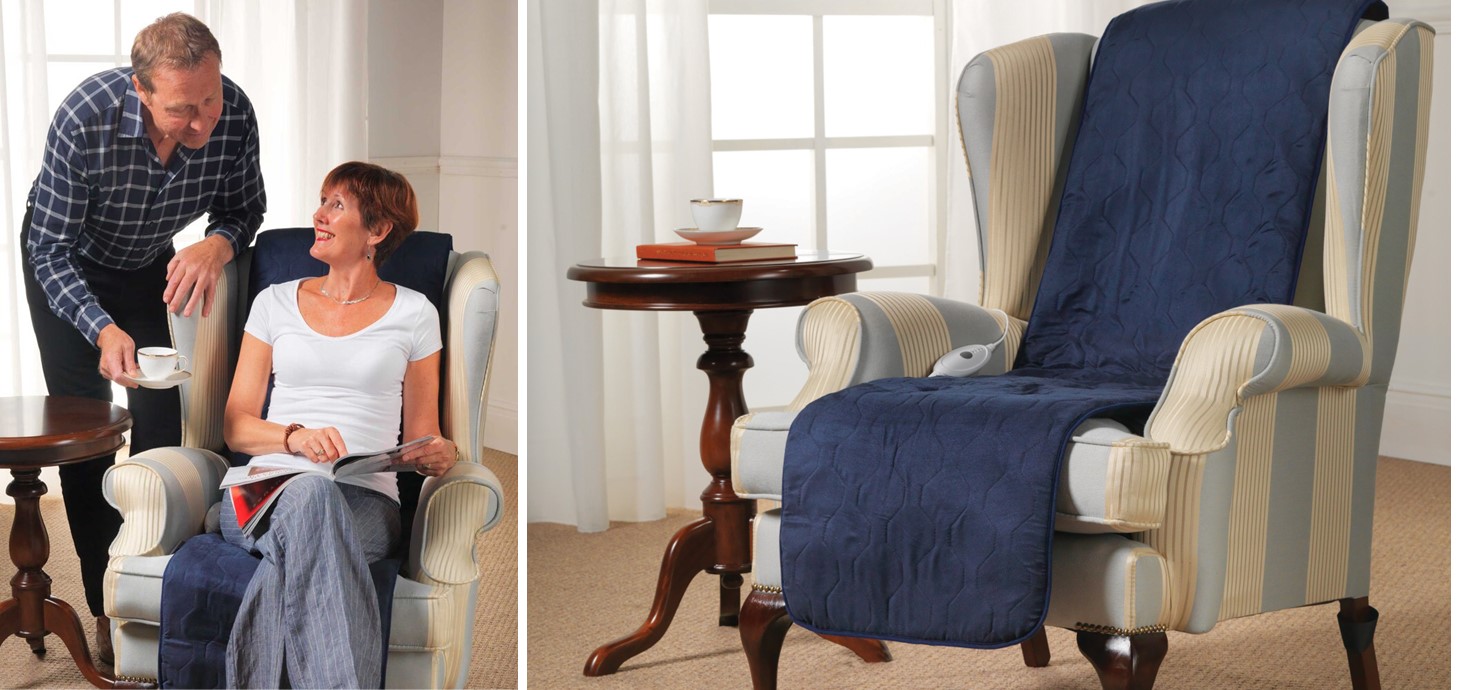
A low-cost heated seat cover that can keep vulnerable older adults warm at the touch of a button is being put to the test using Swansea University expertise.
The B-Warm was inspired by a devoted husband’s desire to help care for his wife who suffered from arthritis. Martin Lewis, director of Usk-based Homeglow Products, says his late wife felt the heated seats of the couple’s car eased her pain so much she wished she could bring them into the house.
So, Mr Lewis invented a seat cover and warmer which can be placed over an ordinary chair and adjusted with a simple control panel.
He has now been collaborating with the University’s Healthcare Technology Centre to examine just how beneficial the device is for older adults, particularly those living alone with underlying health conditions, or those with mobility problems.
The HTC undertook a study which evaluated participants' wellbeing and musculoskeletal pain over a month of use. To carry out this research the team worked with Delta Wellbeing which identified suitable clients - those living independently but with support - and then delivered and fitted the B-Warms and assisted with data capture. Half of the B-Warms used were provided by energy firm Cadent Gas.
The study was also supported by expertise of the Centre for Ageing and Dementia Research (CADR) and iLab.
Dr Bethan Thomas, Senior Innovation Technologist for HTC, said: “Maintaining our internal temperature within a degree or two of 37 degrees is vital to a healthy body. However, as we get older it is harder for us to thermoregulate our bodies, putting extra stress on the cardiovascular system, which can also be compromised with age and several other illnesses.”
Mr Lewis approached HTC experts to carry out a study that would assess its impact on the comfort and wellbeing of users as well as the potential physical and mental benefits.
He had previously worked with National Energy Action, a national fuel poverty charity working across England, Wales and Northern Ireland, to study to the B-Warm can significantly cut home heating costs.
Dr Ffion Walters, Innovation Technologist for HTC, said: “Delta Wellbeing used its relationships with various residential homes to recruit participants, HomeGlow and Cadent Gas donated 100 B-Warms. We then assessed changes in wellbeing and pain using a structured questionnaire completed by participants before and after using the seat warmer over a one-month period.”
The feedback from the participants was overwhelmingly positive. The significant findings from the questionnaire revealed that 75 per cent of the volunteers declared an improvement in subjective wellbeing with 73.9 per cent declaring a reduction in their pain level.
Mr Lewis said: "I developed the B-Warm to help my late wife Audrey keep warm in a rather cold damp cottage. Following her death in 2016 and having realised its physiological and energy saving benefits, it seemed only right to promote and build the product’s reputation which also helped me overcome my loss by keeping me busy.”
He now hopes the research being carried out by the University will provide important additional evidence about his product’s health benefits.
Mr Lewis said: “The B-Warm has already been very successful - production has increased to three times the original level and the current energy crisis means that the latest stock order is virtually sold out. Hopefully, the collaboration with Swansea University will confirm both the psychological and physiological benefits of the B-Warm to those with chronic or temporary health issues."
The HTC, based at the University’s Medical School, is committed to ensuring research, innovation, and expertise is utilised to develop better treatments and prevention mechanisms for various diseases. It is part of the £24 million pan-Wales Accelerate programme, co-funded by the European Regional Development Fund, through Welsh Government, universities, Life Sciences Hub Wales, and health boards.
Mr Lewis also contacted AgorIP for support with his innovation. The AgorIP scheme is supported by the Welsh Government and the European Regional Development Fund, and through this they were able to provide commercial mentoring and support via BIC Innovation to help with ‘succession planning’ and assistance with developing the business further.
